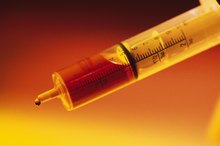Elevated Cardiac Enzymes and Troponin
As a muscle that expends energy, the heart requires its own supply of blood, just like the tissues to which it pumps blood. Blood carries oxygen, which is used to make ATP in cells. The ATP is an energy source required for muscular contraction.
If you are experiencing serious medical symptoms, seek emergency treatment immediately.
If an artery of the heart becomes blocked, the tissue downstream from the blockage will be deprived of oxygen. This is called a heart attack, or myocardial infarction [2](# 'inline-reference::“Harrison’s Principles of Internal Medicine”; Anthony S Fauci et al.
; 17th Ed. 2008'). In a short time, the cells of the tissue will die, releasing cardiac enzymes into the blood, and that portion of the heart will no longer be able to contract 1. The muscle will be replaced with scar tissue.
Types
Cardiac enzymes are proteins normally found in the muscle cells of the heart, where they perform specific functions such as helping muscular contraction or energy metabolism.
When the cells are damaged, they break open, or lyse, releasing their contents including the enzymes into the blood. Some of the cardiac enzymes measured in the blood include troponin T, troponin I, creatine kinase, lactate dehydrogenase and glycogen phosphorylase isoenzyme BB.
Functions
What Is the Difference Between Smooth & Cardiac Muscle?
Learn More
Troponins control the binding between the proteins actin and myosin -- these proteins bind together using ATP as an energy source to contract the heart muscle cells. Troponins are found in all muscle cells, but troponin T -- normally less than 0.2 mcg/L -- and I -- normally less than 0.35 mcg/L -- are more specific to heart muscle [1](# 'inline-reference::“Robbins and Cotran Pathologic Basis of Disease”; Vinay Kumar et al.
; 8th Ed. 2009')23. Creatine kinase -- normally 0 to 3 mcg/L -- helps to regenerate used ATP. Lactate dehydrogenase helps in energy metabolism. Glycogen phosphorylase isoenzyme BB also helps in energy metabolism.
- Troponins control the binding between the proteins actin and myosin -- these proteins bind together using ATP as an energy source to contract the heart muscle cells.
Diagnostic Value
After a heart attack, enzymes typically rise within 2 to 4 hours. A blood test can measure the presence of these markers and, along with other data from the medical history and an ECG, can help to determine the likelihood that a person is having a heart attack.
False Positives
Elevated Liver Enzymes and Congestive Heart Failure
Learn More
Some of these enzymes are not as specific for cardiac muscle. CK-MB is found in muscles other than the heart, so damage to other types of muscle, such as skeletal muscle, can release CK-MB. However, measuring enzyme levels such as these are still useful.
Troponin I and T are specific to the heart, and remain elevated for a long time after a heart attack occurs 3. Since CK-MB rises and falls rapidly, it can be used to determine if a second heart attack is occurring while troponin I and T are still elevated from the first heart attack. In addition, troponins tend to be elevated in some forms of kidney disease, so troponins are not as useful in this situation, whereas CK-MB can be 1.
- Some of these enzymes are not as specific for cardiac muscle.
Related Articles
References
- “Robbins and Cotran Pathologic Basis of Disease”; Vinay Kumar et al.; 8th Ed. 2009
- “Harrison’s Principles of Internal Medicine”; Anthony S Fauci et al.; 17th Ed. 2008
- “Henry's Clinical Diagnosis and Management by Laboratory Methods”; Richard A. McPherson et al.; 21st Ed. 2006
- Mair J, Jaffe A, Apple F, Lindahl B. Cardiac biomarkers. Dis Markers. 2015;2015:370569. doi:10.1155/2015/370569
- Garg P, Morris P, Fazlanie AL, et al. Cardiac biomarkers of acute coronary syndrome: from history to high-sensitivity cardiac troponin. Intern Emerg Med. 2017;12(2):147-155. doi:10.1007/s11739-017-1612-1
- Basit H, Malik A, Huecker MR. Non ST Segment Elevation (NSTEMI) Myocardial Infarction. [Updated 2019 May 4]. In: StatPearls [Internet]. Treasure Island (FL): StatPearls Publishing; 2019 Jan-. Available from: https://www.ncbi.nlm.nih.gov/books/NBK513228/
- Arshed S, Luo HX, Zafar S, et al. Elevated Troponin I in the Absence of Coronary Artery Disease: A Case Report With Review of Literature. J Clin Med Res. 2015;7(10):820-4. doi:10.14740/jocmr2280w
- Mills NL, Churchhouse AM, Lee KK, et al. Implementation of a Sensitive Troponin I Assay and Risk of Recurrent Myocardial Infarction and Death in Patients with Suspected Acute Coronary Syndrome. JAMA 2011; 305:1210.
- Thygesen K, Mair J, Katus H, et al. Recommendations for the Use of Cardiac Troponin Measurement in Acute Cardiac Care. Eur Heart J 2010; 31:2197.
Writer Bio
Dr. Matthew Fox graduated from the University of California with a Bachelor of Arts in molecular, cell and developmental biology and received a M.D. from the University of Virginia. He is a pathologist and has experience in internal medicine and cancer research.








